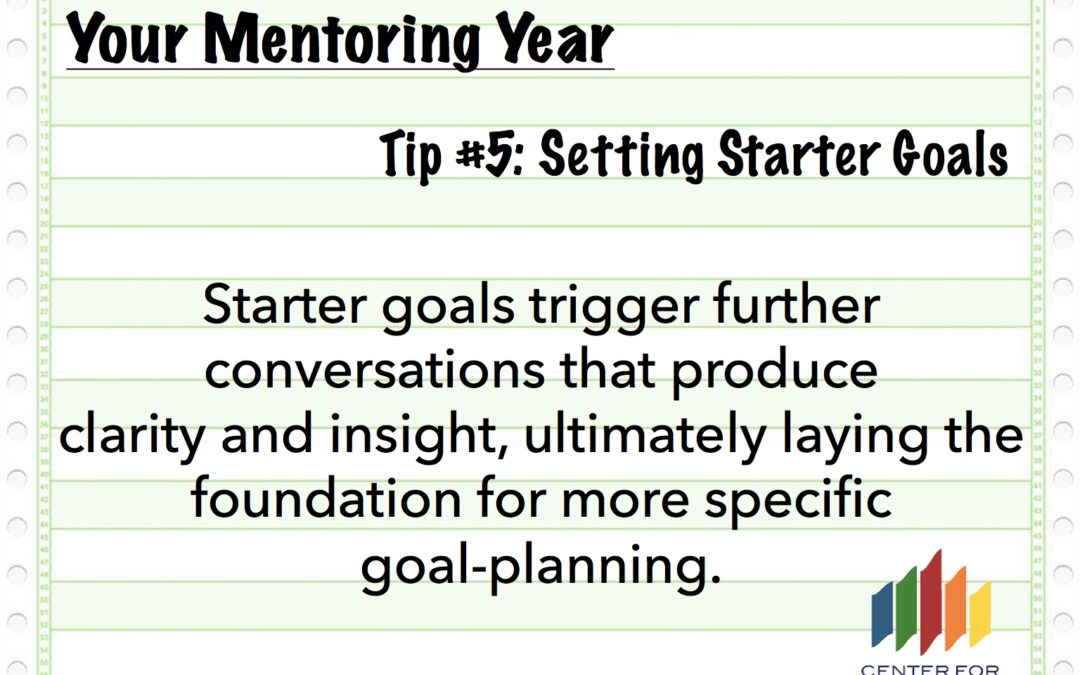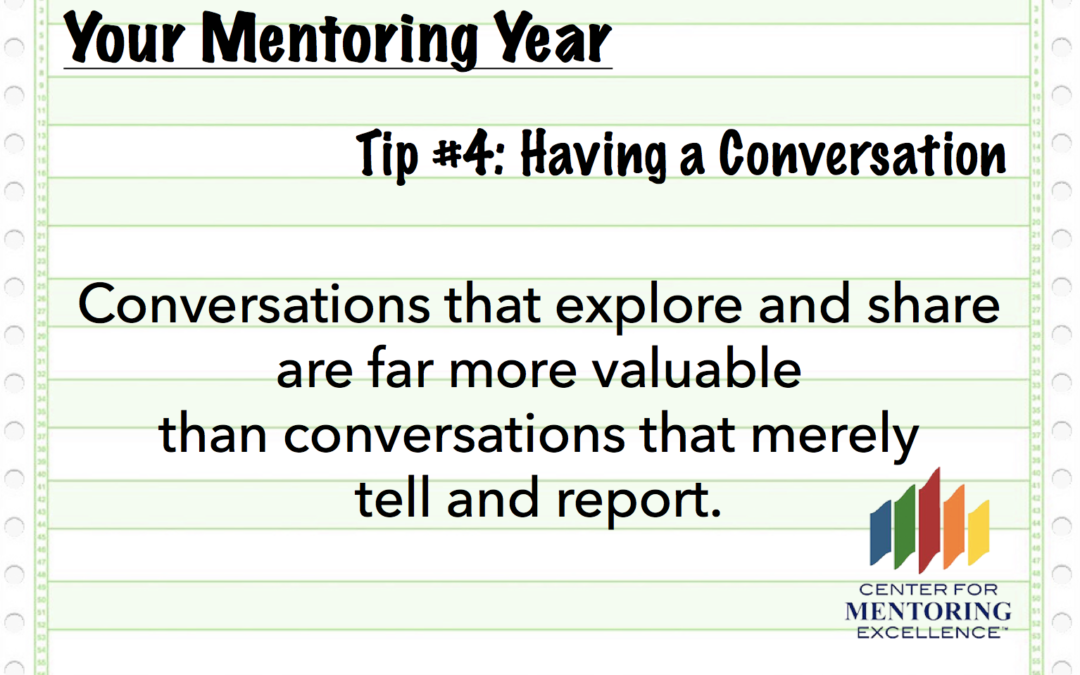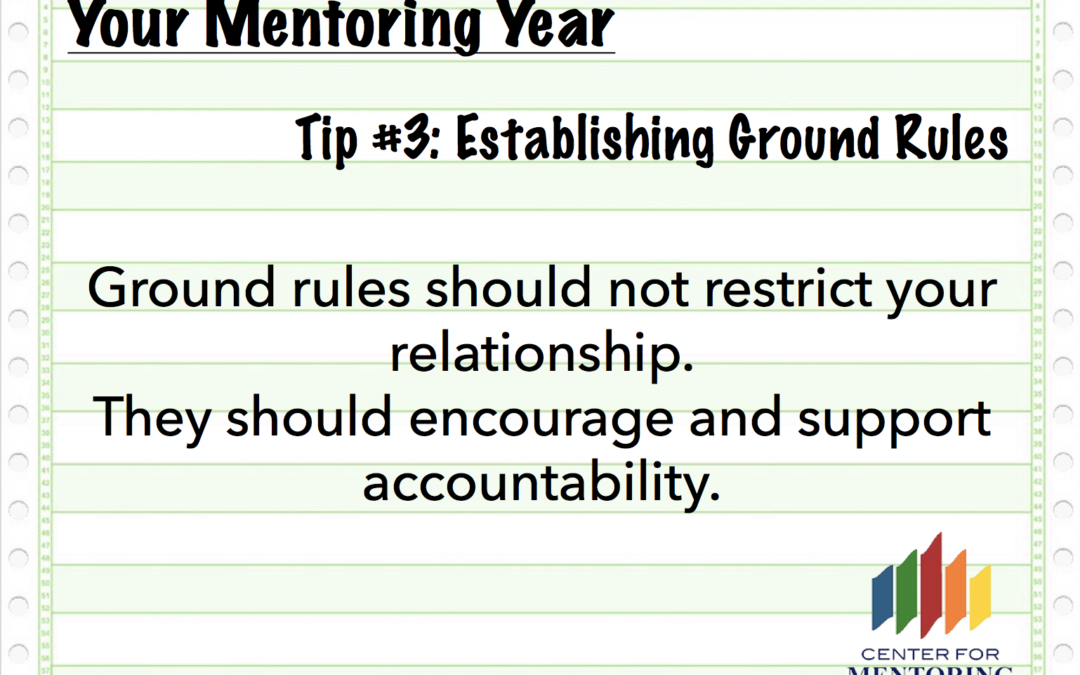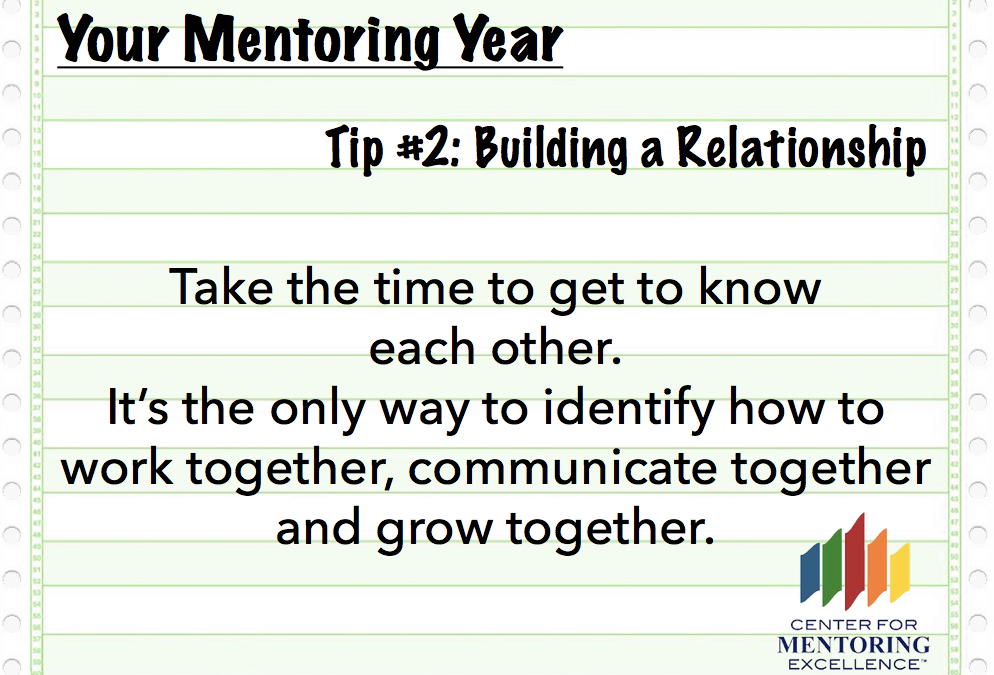
Your Mentoring Year Tip #5: Setting Starter Goals
The goal-setting conversation is an iterative process that usually begins with “starter goals.” (more…)

The goal-setting conversation is an iterative process that usually begins with “starter goals.” (more…)

If you want to have a productive mentoring partnership, you must engage in good conversation throughout your relationship. (more…)

Discussing ground rules is one of the most important conversations you will ever have with your mentoring partner. Ground rules not only manage expectations in your mentoring relationship, but they also lay the foundation for building and strengthening your relationship, allowing you to focus on learning. Rather than restrict the relationship, they encourage and support accountability. Without them, you may end up spending more time managing the relationship than actually learning from your mentor. Here are some strategies for setting ground rules in place:

Listening is an essential mentoring skill and, once again, it topped our Wheelhouse Mentoring Survey list as the number one attribute of a good mentor.
Thanks to the responses of our readers (like you!) we also collected the following additional characteristics of good listeners:
- Uses active listening.
- Provides a safe environment for a mentee to share and take risks.
- Demonstrates empathy.
- Picks up on all the subtle (or not so subtle) clues to tailor appropriate responses.
- Is nonjudgmental and has unconditional positive regard for their mentee.
- Keeps an open mind.
- Is truly, authentically interested in the development of their mentee.
- Encourages mentees to come up with solutions themselves by asking probing questions.
- Stays focused on their mentee.
- Possesses the humility to accept that they don’t know all the best ways of doing things.
- Remains fully present in the conversation.
- Listens and learns; doesn’t just share their expertise.

Here’s an example of how listening should work in a mentoring relationship, and why it’s so important:
Kasi wanted someone to listen and understand her concerns and challenges. Jonah, her mentor, got it and got her.
Kasi: “I feel like I’m stuck. I don’t see where I can go and grow in this organization. Maybe I need to go back to school and get an MBA.”
Jonah: “Feeling stuck is no fun. I think everyone feels that way at one time or another in their career. I know I’ve been there. I found, both for me and many others who have shared those feelings, it isn’t always the long range career path. Sometimes it is a short term lull — like what you are doing now doesn’t interest you anymore. Does that make sense?”
Kasi: “Yes it does, I don’t feel like I am working on interesting projects anymore. All the new projects seem to be going to others. I feel like I am being left behind.”
Jonah: “That, I know, is not a good feeling. When you see others get what appears to be the latest and greatest project, it can easily make you second guess yourself. I just want to remind you of what you told me before in our earlier conversations. And that is your supervisor values your work, and you are well-respected. So I don’t believe it has to do with your contribution. Have you talked to your supervisor about these feelings of yours and about a new assignment?”
Kasi: “I haven’t. I guess I had hoped I would be the natural go-to person when something new came up.”
Jonah: “Well, I am sure that might have been your hope, but I can tell you, as a supervisor, that, number one, I am not a mind reader. I don’t always know that someone wants a new assignment, and two, I do tend to rely on people like you who are responsible and can get the job done. I give them free reign to do their work and appreciate that I don’t have to watch over them. I guess this is a reminder for me, too. Not to take their contribution for granted.”
Kasi: “So you think I need to be speaking up more about what I need, not just put my head down and get the job done?”
Jonah: “I do. Let’s give it a try.”
Seems pretty straightforward, right? As you can see, Jonah is a mentor who listens. He refers back to previous conversations, showing he’s invested in Kasi. He also acknowledges what she’s feeling, listens to the words she’s using, and digs deeper into why she’s feeling the way she does.
What’s great about this example, too? It showcases several other top qualities listed in our survey — empathy, focus, nonjudgmental, etc. A truly great mentor combines these top qualities into an unforgettable experience for their mentees!
Key Takeaway: How well are you listening? Use the top 12 qualities in this post to help you benchmark your listening skills.

Taking the time to work on a mentoring relationship is not always easy. But these relationships are truly the heart of any successful mentoring endeavor. In fact, it’s often a prerequisite for success. Mentors and mentees who discuss their relationship expectations end up experiencing exponentially more success than those who don’t.
One mentee, an associate at a large law firm, lamented that the relationship wasn’t working because her mentor focused only on the path to partnership. The mentee told us, “That’s not appealing to me. It’s like preparing for a pie-eating contest where the prize is more pie.” That mentoring pair was ultimately unsuccessful because they didn’t take the time to learn how each other tick.
Here are some questions to ask your mentoring partner that will set a strong foundation for the relationship:
Missed Tip #1? Find it here. And make sure to come back next month for Tip #3!

Does this mentoring conversation sound familiar?
“When my mentee complains about her VP, I take a small breath. The normal me would start coaching, telling, suggesting, and problem solving. That’s what I am good at. But guess what? That’s not what she is looking for from me, nor does she really need it.
My mentee knows what she needs to do. What she is actually looking for is acknowledgement and support for approach and strategies. So, I’ve learned to don my facilitator hat and start the conversation by asking questions. And I listen. And I learn. I learn what she is thinking. I learn what frustrates her. I learn what she has already tried. I learn what has worked. And mostly I learn what a talented, perceptive, ambitious woman she is. I look for ways to applaud her efforts and her thinking. I hold up a mirror for her and sometimes help her tweak her idea. We both come away having learned something new, along with increased appreciation of our different points of view.”
Conversation should come easy to all of us, right? Wait. Not so fast. What often passes for conversation is sometimes something quite different: information sharing, transactions, question and answer, and even push-back.
Really good mentoring conversation is more about exploring and sharing, rather than telling and reporting. It’s about going deeper, not staying broad and skimming the surface. Good mentoring conversation connects us to one another.
Conversation matters because there is a lot at stake. At the Center for Mentoring Excellence we set high standards for mentoring conversations. We believe really good mentoring depends on a continuum of meaningful conversation. Mentoring partners engage in conversation to grow their relationship, identify learning goals, and work on mentee growth and development. So, you see, there is a lot riding on what you do.
Takeaway: Be brave enough to start a conversation that matters — because it does!